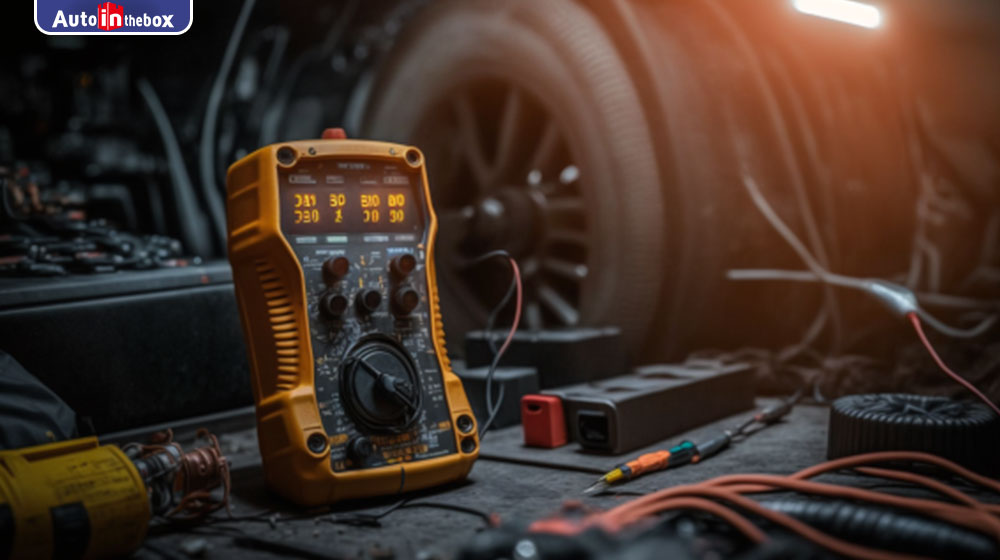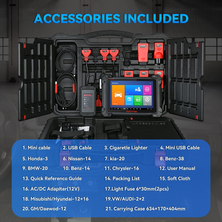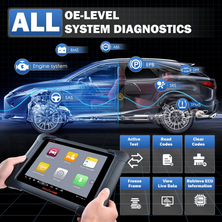
What causes diagnosing electrical problems in cars ?
Automotive electrical system faults can cause various issues with a car's functionality. These faults can include problems with the battery, alternator, starter motor, fuses, wiring, sensors, computer modules, and spark plugs. Symptoms of electrical faults can range from the car not starting to specific electrical components not working to the engine running poorly. Faulty electrical features can cause safety issues, such as malfunctioning lights or brakes. Proper maintenance and regular checks of the car's electrical system can help prevent these faults from occurring.
Recommended 2023 top car diagnostic tool: Launch pros V,Launch V+,Launch pros mini,Autel MS906pro,Autel ultra lite
Causes of car electrical problems
There are many potential reasons for faults in automotive electrical systems, including:
- Loose or corroded connections: Relations between wires and components can become loose or corroded, leading to poor electrical contact and faults.
- Dead battery: A battery that has run out of charge or has failed can result in the electrical system not functioning correctly.
- Faulty alternator: The alternator is responsible for charging the battery and powering the electrical system when the engine is running. If the alternator is defective, the battery may not charge properly, resulting in electrical faults.
- Blown fuses: Fuses are designed to protect electrical components from damage caused by power surges. If a fuse blows, it may cause the affected member to stop working.
- Failed sensors: Modern vehicles rely on various sensors to monitor multiple systems and adjust as needed. If a sensor fails or becomes faulty, it can lead to issues with the electrical system.
- Broken wires: Wiring can become damaged over time due to wear and tear, exposure to the elements, or accidental damage. Broken wires can cause short circuits or prevent electrical signals from reaching their intended destination.
- Failed relays: Relays control the flow of electricity to various components. If a relay fails, it can cause the element it contains to stop working.
- Faulty computer modules: Modern vehicles have various computer modules that control multiple systems. If one of these modules fails, it can cause issues with the electrical system.
Car Electrical problems performance
There are various signs that a car may be experiencing electrical faults. Some common symptoms include:
- The engine won't start or is difficult to start.
- The car's battery is dead or keeps losing its charge.
- Electrical components like lights or power windows are not working correctly.
- The car's dashboard warning lights are on or flashing.
- The car is running poorly or stalling.
- Unusual smells or smoke are coming from the car's electrical components.
- The car's radio or other entertainment systems are not functioning correctly.
- The car's brakes or ABS are not working as they should.
- The car is experiencing intermittent electrical issues or faults.
- Unusual noises are coming from the car's electrical system.
It's essential to diagnose and repair any electrical faults as soon as possible to prevent further damage and ensure the car's safety and reliability.
Car Electrical problems Troubleshooting method
Diagnosing automotive electrical faults can be challenging, but several methods can be used to identify the source of the problem. Some standard diagnostic procedures include:
- Visual inspection: A thorough inspection of the car's electrical components can often reveal damage or wear, such as corroded connections or broken wires.
- Multimeter testing: A multimeter can test the voltage and resistance of various electrical components to determine if they are functioning correctly.
- Diagnostic scan tools: Modern cars have onboard computers that can store diagnostic codes indicating issues with various systems. Diagnostic scan tools can be used to read these codes and identify the specific problem.
- Circuit testing: Circuit testing involves using specialized equipment to test the electrical circuits in the car's electrical system to identify faults or breaks in the course.
- Signal injection testing: Signal injection testing involves using a specialized tool to inject a signal into the car's electrical system to determine if it is reaching its intended destination.
- Voltage drop testing: Voltage drop testing involves testing the voltage drop across various electrical components to determine if there is an issue with the element or its wiring.
- Continuity testing: Continuity testing involves testing the electrical continuity of a circuit or component to determine any breaks in the course.
Diagnosing and repairing electrical faults with a qualified technician is essential to ensure the car's safety and reliability.
Car electrical problems Troubleshooting and Repair
If you suspect an electrical fault in your car, there are several steps you can take to troubleshoot and repair the issue. Here are some general steps to follow:
- Identify the symptoms: Note any symptoms you have noticed, such as warning lights, dead batteries, or malfunctioning components.
- Check the fuses: Check the car's fuse box and replace any blown fuses with new ones.
- Inspect the battery: Check the battery's connections and voltage using a multimeter. If the battery is dead or faulty, replace it.
- Check the alternator: Test it using a multimeter to ensure it functions correctly.
- Inspect the wiring: Check the wiring for damage, such as frayed wires or corroded connections. Repair or replace any damaged wiring.
- Test the sensors: Test any sensors that may be faulty using diagnostic equipment.
- Check the computer modules: Test the car's modules using diagnostic equipment to identify faults.
- Replace faulty components: Replace any defective components, such as a malfunctioning starter motor or alternator.
- Test the repairs: Once complete, test the car to ensure the issue has been resolved.
It's important to remember that some electrical faults can be complex and require the expertise of a qualified technician. If you need clarification on diagnosing or repairing an electrical fault, it's best to take your car to a professional mechanic.
There are several steps you can take to prevent electrical problems in your car:
- Regular maintenance: Ensure your car receives regular maintenance, including battery checks, wiring inspections, and diagnostic scans, to identify and prevent potential electrical issues.
- Keep connections clean and tight: Keep electrical connections clean and close to prevent corrosion and loose connections, which can cause electrical faults.
- Avoid overloading the electrical system: Avoid overloading the car's electrical system by using only a few electrical components simultaneously, such as running the air conditioning, stereo, and other electronics simultaneously.
- Use high-quality components: Use high-quality components when replacing electrical components, such as the battery, alternator, or starter motor, to ensure their reliability and prevent premature failure.
- Protect electrical components from the elements: Protect electrical components from exposure to moisture, dust, and other factors that can cause damage or corrosion.
- Avoid DIY repairs: Avoid DIY repairs unless you have the necessary expertise, as improper maintenance can cause more damage and lead to electrical faults.
- Follow the manufacturer's recommendations: Follow the car manufacturer's recommendations for electrical maintenance, including replacing components at the recommended intervals.
By following these preventative measures, you can help ensure the reliability and safety of your car's electrical system and prevent potential electrical faults.











